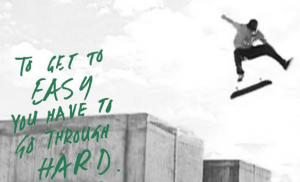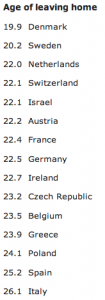Everything is hard before it is easy
“To get to easy you have to go through hard .” This was a recent Mountain Dew advert on the back of a bus and on billboards in Wellington.
.” This was a recent Mountain Dew advert on the back of a bus and on billboards in Wellington.
This parallels a message I have been teaching students about learning – “Everything is hard before it is easy.”
When students are studying for an exam, the best tip I can ever offer is the idea they need to learn what they don’t know – going over and over what they do know, is largely a waste of time. Learning is finding out what you don’t know and learning it. For example, our daughter brought home 10 spelling words and advised us that the teacher had asked her to write them all out ten times a night for 4 nights. I asked her which ones could she already spell. After a shrug of shoulders, I tested her. She accurately and confidently spelt nine correctly. She only now needs to learn one. One of the words on her list that she could spell was ‘family’. If she writes this out 40 times over the week, will she get better at spelling it? No – it’s a waste of time.
This is true of all learning, going over what you know makes you feel good. “Oh I know that”, “Aren’t I clever” , “I’m so smart” are the internal responses that send endorphines through the brain and make us feel good. In contrast, when you attempt to learn something that you don’t know – it is hard. The internal voice might say; “This is hard”, “I’m not as smart as I thought I was”, “I can’t do this.” It is uncomfortable, awkward and that feeling of potential failure is something most of us like to avoid, however this is exactly what learning new and unfamiliar content feels like. When learning gets hard, many people give up. Again the key is, as the advert says, “To get to easy, you have to go through hard.”
Michael McQueen, award winning speaker, author and social researcher (Keynote speaker at the next Teachers Matter conference 2015) explains a difference between the Gen Y and the Baby Boomers and Gen X (approximately pre 1980). He proposes these earlier generations were taught that life is hard, life is unfair, toughen up and get over it. In contrast the Gen Y’s believe life is suppose to be easy. So why do they think life is easy?
Advertising tells us life is easy – fast loans so you can buy what you like, beauty products that will solve all your challenges, gadgets to make life simple such as vacuum cleaners that clean the floor automatically, keyless cars, dishwashers, fast food, just add water products, even spray and wipe has been replaced with wet and forget! Easy…
 Bubble wrapped children –Teachers consistently tell me the challenges they deal with – parents that insist on doing everything for their child – from hanging up their bag at school to doing the homework for them. Just this week, I witnessed Mum’s filling out 14 and 15 year old boys registration forms at a workshop – presumably because it was quicker and neater to do it themselves. As Steve Gurney, 9 time winning of the Coast to Coast race, (another wonderful Keynote speaker at the 2015 Teachers Matter Conference) advocates our children are no longer allowed to ‘eat dirt’, fail, fall or learn through the experiences that make then stronger and resilient. Life is easy.
Bubble wrapped children –Teachers consistently tell me the challenges they deal with – parents that insist on doing everything for their child – from hanging up their bag at school to doing the homework for them. Just this week, I witnessed Mum’s filling out 14 and 15 year old boys registration forms at a workshop – presumably because it was quicker and neater to do it themselves. As Steve Gurney, 9 time winning of the Coast to Coast race, (another wonderful Keynote speaker at the 2015 Teachers Matter Conference) advocates our children are no longer allowed to ‘eat dirt’, fail, fall or learn through the experiences that make then stronger and resilient. Life is easy.
Everyone is equal philosophy – The current generation are growing up in such a PC world that everyone gets a ribbon for participation, whether they give effort of not. The score is no longer kept when young children play sport. Everyone gets a prize when playing Pass the Parcel at birthdays. Schools are discussing whether honours boards should be taken down. It is easy to get rewards.
Dumbing down of the curriculum – previous generations were required to learn the periodic table and now students are given it – now whilst I understand the logic of this, that it is the understanding of the concept rather than the memorisation of a concept that is important, it has perhaps robbed our students of the need to practice, repeat and memorise information. I recently asked a group of students if they could recall their best friends phone number – an overwhelming percentage of students said no “it’s in my phone.” Learning is easy, the facts will be given to me.
In what other ways have our children been taught that life is easy?
The challenge with this ‘life is easy’ sell, says Michael McQueen, is when life gets hard, young people either change their goal (leave school, change jobs, find a new partner etc) or they think they are not good enough and their self esteem plummets. Recently I was speaking to 120 Scholarship students. They remarked scholarship is hard. I smiled and said “It is supposed to be – if it was easy everyone would do it!” This was a revelation for so many of them.
I believe we have a huge responsibility as teachers and parents to ensure our children know that life can be hard, that they will fail and that life can be unfair. I’m not suggesting we be all doom and gloom, simply that bad stuff will happen amongst the good.
Twentieth Century Philosopher, Buckminster Fuller, said, “Life is full of lessons to be learned. When you have learned one lesson, life will give you a bigger lesson.” Have you noticed that? Once you get through a big challenge, you are given a bigger one to deal with. Challenges and life lessons never get easier. I wrote about this in a previous blog ‘Transformational Learning.’
How will children learn about winning and losing if they don’t experience it? How will they learn to take disappointment? What happens when they don’t get their way? How will they develop the skills of persistence, grit, resilience, responsible risk taking, flexible thinking, creativity etc. if life and learning is always easy?
In what ways might you go about helping students know that they need to go through hard to get to easy?
As a side note: Did you know that the average age a child leaves home is rising? In 2007 the average age for a child to leave home was 20.3 years (This is the Australian statistic as I was not able to find the NZ numbers.) In Europe the average age a child left home in 2008 is shown in the table on the right. There is a growing trend that this number is increasing ( I have heard 27 being talked about as an average age of leaving home) – not because they cannot afford to leave home – they can. However they can’t afford to replicate the quality of life they have at home; dishwasher, dryer, automatic ice dispenser, free wifi, etc … and they are not willing to live without.
Europe leaving home statistic source: http://blogs.psychcentral.com/single-at-heart/2012/06/leaving-home-in-15-countries-how-old-are-the-grown-children-when-they-leave-and-how-far-do-they-go/
Tags: failure, Gen Y, learning
Published on Wednesday, July 9th, 2014, under Learning, Teacher Effectiveness



Karen, this is a terrific commentary. Made me think about my own boys and how we are raising them. I remember Celia Lashlie talking about the mothers that unpack the boys bags before school etc and since having a little boy myself have sworn I will not be ‘that’ mother but do find myself having to bite my tongue as I sometimes leap in to rescue when the lesson is best learnt through experience! Thanks so much for the reminder, the questions and some suggestions too 🙂
Yes – I still have to stop myself from jumping in too quick – one thing I have noticed is if I take my time, take a breath – my kids often work it out – perhaps the cry for help is not actually that – it is a cry of frustration, then left alone they have time to think…
Grea post Karen.
I completely agree with your thoughts and ideas, from a teachers perspective, not a parent, I think sometimes we are taking away from students something really amazing called “a sense of achievement” which people get from working hard and earning or learning something, which is a wonderful life gift in itself, and is rewarding, too often I see students work really hard and something and achieve, only to be given the same as the person who put no effort in…. Just so we can be fair? What is that teaching students?
I so agree – I hear kids saying “Why work harder for an excellence, cos you don’t get any more for it” – we also need to help them reflect on the inner rewards – how you feel about yourself at the end of the day…
Another brilliant article, Karen. Thanks!
I’m just about to share it.
Thanks Judith – such an important topic and one that we often don’t think of…
Standing ovation!
How do we get the message through? We are using visual cues at our school to encourage independence in our junior children. Although the children are capable the parents sometimes feel forsaken and therein lies the problem.
Yes visual reminders for parents – must have a look next time I visit… 🙂
Totally agree Wendy, our best way of supporting whanau is through children but an added bonus of some parental visuals would be powerful!
Thank you for another fab blog Karen! I do so love your inspiration…
I totally agree with you Karen. I have found the best way to make your children resilient and independent is to pack them off to a Uni a long way from home and let them learn out how to survive without rescuing them when things get tough. Not that I haven’t done that financially (sometimes you do need to help out) but the life lessons your children learn at this stage of their lives are enormous. Really enjoyed reading this article and we’ll worth sharing far and wide.
Ha – so true – must remember that when our children are older…
[…] Michael McQueen explains a difference between the Gen Y and the Baby Boomers and Gen X (approximately pre 1980). He proposes these earlier generations were taught that life is hard, life is unfair, toughen up and get over it. In contrast the Gen Y’s believe life is suppose to be easy. So why do they think life is easy? Read more … […]
Thanks Karen – you have ‘hit the nail on the head’ so to speak. This is an issue that really concerns me and I think as time goes on, will become one that will be necessary for parents and in some cases, teachers to deal with. There are so many quotes out there and ‘fluffy’ sayings, but in the end it is the actions of parents I believe in particular, to raise the bar and give credit to their kids and their capabilities. I believe you get what you expect and if we make everything easy for our kids then we lower our expectations and therefore lower their performance.
Yes Jenny – I was once told that my high expectations would lead me to be continually disappointed – and whilst this is sometimes true, I still hold them high. Thanks for taking the time to read my blog and comment 🙂
[…] it hard to learn new information, but the more we do it, the easier it gets. (See my earlier blog Everything is hard before it is easy.) As adults we need to step back and let children struggle and work it out for themselves. I see […]
[…] what you don’t know. Learning what you don’t know is often hard and I often use the mantra – “Everything is hard before it is easy”. This is a fundamental idea key to successful learning. What do your students do when the task gets […]
[…] what you don’t know. Learning what you don’t know is often hard and I often use the mantra – “Everything is hard before it is easy”. This is a fundamental idea key to successful learning. What do your students do when the task gets […]
[…] students understand the learning process (see my blogs; How do students know they know?, Everything is hard before is is easy, MLE’s – the underlying philosophies) and have the language to explain it, it is often […]
[…] students understand the learning process (see my blogs; How do students know they know?, Everything is hard before is is easy, MLE’s – the underlying philosophies) and have the language to explain it, it is often […]